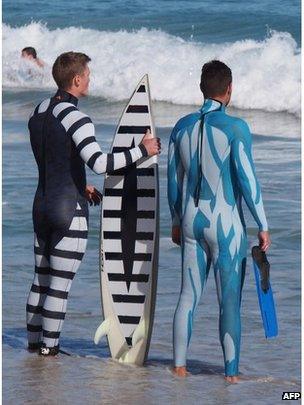Australian firm develops 'shark-proof' wetsuits
- Published

The striped suit tells sharks a diver is a not safe to eat while the blue design acts as camouflage
Two Australian businessmen backed by a university research project have launched what they claim to be the first shark-repellent wetsuits.
Their blue and white Elude suit is said to make divers much less visible to sharks by drawing on research into the way they see their prey.
A separate design - the Diverter - has black and white stripes to signal that a surfer is not good to eat.
The project, external follows a wave of shark attacks in Western Australia.
Sharks are common in Australian waters but fatal attacks are rare - on average, one person is killed by a shark in a year.
But five people were killed in the year to July 2012.
The designers say they used new scientific insights into sharks' perceptions of light and colour blindness to come up with a product which could camouflage a diver or snorkeler in the water.
One of the entrepreneurs, Craig Anderson, told the AFP news agency that the Elude suit created "confusion" for the shark's visual systems.
'Substantial demand'
The University of Western Australia researcher, Shaun Collin, said the black-and-white design would ward sharks away from surfers.
"Many animals are repelled by a striped pattern which indicates the potential prey is unsafe to eat."
Western Australia's government funded tests with dummies and tiger sharks off the state's coast.
Tiger sharks were observed swimming past dummies wearing the striped pattern wetsuits, whereas those clad in traditional black wetsuits were attacked.
Further testing will be done off southern Australia and South Africa when summer begins in the southern hemisphere.
Mr Anderson said there was "substantial" demand across the world for technologies to repel sharks.
"Everyone's looking for a solution, everyone's nervous about going in the water around the world now," he added.
But Ali Hood, conservation director for the Shark Trust in the UK, told the BBC: "To suggest that 'Everyone's nervous of entering the water' is rather strong."
She said there had been a growth in the water sports market and more people than ever were entering the water all year round, but there was no corresponding increase in shark encounters or fatalities.
Ms Hood said the Shark Trust welcomed all progress with regards to the development of non-fatal shark repellents or exclusion devices.
But, she added: "Sadly, a great number of the fatalities attributed to sharks occur in avoidable circumstances: swimmers entering the water where shark warnings have been given; surfing at dawn or dusk on reefs known to be frequented by sharks; and spear fishermen carrying their catch close to their bodies."
- Published25 January 2012
- Published17 July 2012
- Published15 July 2013